Elizabeth: Bertie, I don't think your brother would eat a hot dog.
George VI: How would you know that?
Elizabeth: Because he'd know what was meant!!
George VI: It doesn't mean anything!...Don't ever compare me to my brother again.
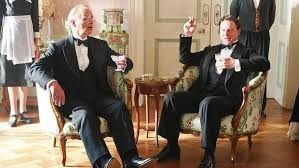
What a disappointment. I was hoping that the critics were wrong about this one (it was panned) but they were right -total crap.
It sounded like an interesting premise: Franklin D. Roosevelt and Eleanor Roosevelt meeting with King George VI and Queen Elizabeth on the brink of World War II to discuss a potential alliance.
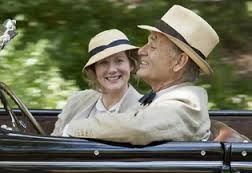
Sadly, the movie focused less on this important meeting and more on FDR's romances with his mistresses, particularly Daisy Stuckley, played by Laura Linney. Laura Linney's not my favorite actress, but her character was particularly unlikeable in this. Daisy is simpering, passive, and doe eyed. She doesn't seem to have anything else in her life other then keeping FDR company and pleasing him. When she discovers that he has canceled an evening tryst with her only to have sex with another mistress, Missy, at the house he supposedly built especially for Daisy, FDR even has the gall to send the mistress he is in bed with to run after Daisy and convince her that it's okay to share him -you know, because he's such a great, important man, so they just need to be understanding:
Daisy: I don't think I can 'share'.
Missy: Oh I think you can.
And she buys it. Gross. FDR, played by Bill Murray, is made out to be very sleazy. Watching his smug, condescending reaction as two of his mistresses bicker over who gets to take care of him is gag-worthy:
Missy: What are those for?
Daisy: He has a headache.
Missy: You do?
Daisy: It's his sinuses again. Happens this time every year.
Missy: I know that. You didn't say anything about having a headache.
Daisy: He's not going to trouble you with everything. You have enough on your plate.
Missy: What does that mean?
FDR: It means, Missy, that you take very good care of me. [To Margaret] It means you do too.
For a moment, when FDR calls her to his office after the incident, I thought she'd actually mustered some gumption when she yells furiously, "No, you’re not getting off that easy, you son of a bitch!" Then it goes back a step and we find out that the yelling was just in her head: "But that’s not what I said. Instead: 'No. I need to go.'" She goes home and makes her big stand after the King and Queen have left: "The next day, he sent a car. But I said I was too ill to take a drive. I was ill the next day. And the next. And the next day after that. A week after the Royals’ visit to Hyde Park, the President came in person to my house. I had been waiting." And he's forgiven. Wow, she really showed him. Their romance is beyond boring, and there's a lot of it.
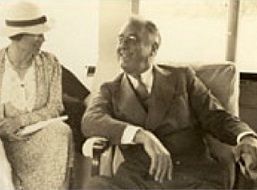 |
| The real Margaret (Daisy) Stuckley and FDR. |
The movie could have done without Laura Linney's character entirely, and been better for it. If it had centered on what was actually interesting about the story, the meeting between the figureheads of two of the major world powers as war looms, it could have been good; instead, we get to watch FDR show Daisy his stamp collection. And throughout the whole thing, Daisy narrates EVERYTHING, and it is monotonous, overly-sentimental, bad writing. Instead of telling a story with meaningful dialogue or through strong performances, the movie just relies on Daisy telling us what is happening and what everyone is feeling.
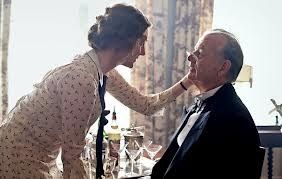
I read that the movie is not considered very accurate historically. While FDR certainly had romances with these women, it's not known whether he had sexual relationships with them. Also, while the movie insinuates that Eleanor Roosevelt was a lesbian, I don't believe there is evidence supporting that conclusion. As Conrad Black states on Nationalreview.com: "This film pushes it, with Missy emerging from FDR’s hilltop cottage rebuttoning her blouse as Daisy arrives, and the king and queen observing his return from their bedroom window in the middle of the night. Roosevelt’s medical records survive, and there is no doubt that he retained his sexual powers after the onset of polio in 1921, though the impact of inactive legs might have been inhibiting even to such a confident man. Hyde Park is pretty explicit in implying that Eleanor was a lesbian. There is no more substance to this allegation than to the feminist confection that Eleanor was a virtual co-president. The only evidence of supposed lesbianism is a letter to one of her lady friends about the pleasure of kissing her dimpled cheek. It is more likely that she was simply asexual after, as she put it, “doing her [maternal] duty.”"
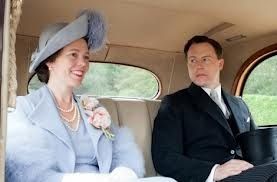 The time spent discussing the upcoming war is extremely brief. Much of the time the King and Queen are on screen is filled with their American hosts going out of their way to be rude to them and make them uncomfortable. In one instance, Queen Elizabeth enters her husband's room to find him looking at pictures on his wall:
The time spent discussing the upcoming war is extremely brief. Much of the time the King and Queen are on screen is filled with their American hosts going out of their way to be rude to them and make them uncomfortable. In one instance, Queen Elizabeth enters her husband's room to find him looking at pictures on his wall:Elizabeth: What are they of-?
George VI: British soldiers. The 1812 War. Cartoons actually. Mocking them. Us.
Elizabeth: They put you in a room with-?
George VI: The mother tried to apologize. I told her I found them funny. She said she tried to remove them, but her son insisted.
Elizabeth: Why would he do that? What was he trying to say?
George VI: I don't know. I don't know. He knows this is important. He knows why we’re here.
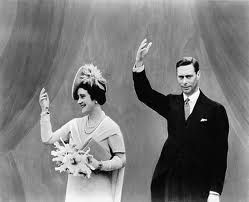 |
| The real Queen Elizabeth and King George VI. |
Regarding the King and Queen, I hated how their relationship was portrayed, with the Queen berating him for his stuttering and comparing him unfavorably to his elder brother more than once: "They're trying to make us seem common. Your brother would never have stood for this. I'm sorry, but he wouldn't." Everything I've read has always indicated that they had a very close, supportive relationship. I can't see those words ever coming out of her mouth -I think it would have been devastating for him, and she did not approve of his brother's behavior at all -but who knows, maybe I'm wrong. The King also seems like a scared young child, with FDR acting as the wise fatherly figure giving him a pat on the head, which I didn't like at all. The King had his own strength in my opinion, and FDR isn't shown as very fatherly or wise the rest of the movie, so it doesn't fit.
Bad, bad, bad all around.
Defiantly a dud. When you explained the plot I was intrigued, but the movie failed to deliver on every level. The love story was crap'o'rama, the meeting with the King was way too short and completely unsatisfying and his wife was a total b*tch. I stand by my initial groan.
ReplyDeleteDisappointing :( I was hoping the critics were wrong, but this does sound terrible.
ReplyDelete